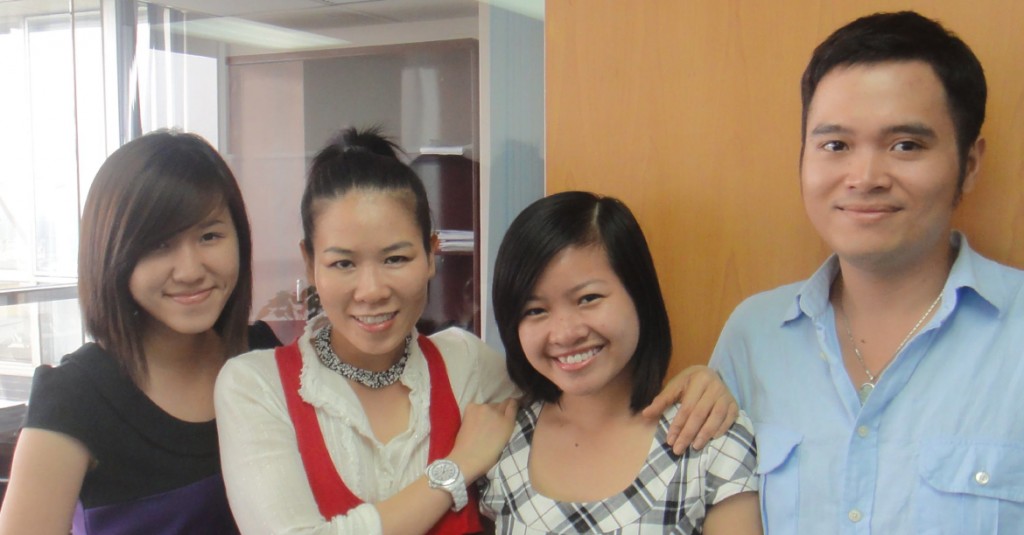Our global PR interview series is featuring Vietnam this week: The communication specialists of VERO Public Relations are giving us an insight into the general development of PR and current media and communication trends. Recent PR examples demonstrate how to utilize these trends to do successful PR in Vietnam. The series is based on phone or face-to-face interviews and written input, therefore please excuse language mistakes which might reflect foreign language influences.
1. What is the latest change in PR you have identified in your region?
Son Nguyen: PR activities and businesses’ opinion about them have changed significantly over the last few years. As Vietnam economy is growing swiftly and joined by more international companies, the need of building a strong brand image to be distinctive in the market has become vital. Thus, PR role has shifted from only polishing a brand name to communicate the brand key messages (or stories) to the public in both emotional and rational way.
For years, Vietnam did not have any professional institution or university majoring in PR. This is changing now. Both national and private foreign universities have established curriculum and courses focusing on communications, advertising and PR. At the same time, the bar for Vietnamese PR consultants is also lifting, requiring them to be more professional, open-minded and creative in order to meet international standards of their clients.
Although the industry is moving forward, there are influential factors which people practicing PR in Vietnam still need to take into consideration such as Vietnamese language, culture, media system and legal framework. Finally, online communications is gaining the spotlight as one of the most effective PR tools. While the Vietnamese youth are embracing social network sites, online communication platform is also praised as a multi-way channel, giving people opportunities to share their ideas, opinions and viewpoints. The number of Vietnam Internet users exceeded 24 million (27% population) while Facebook has also surpassed the number of 1 million. Thus, many businesses see this as a new channel through which their messages can be conveyed effectively to their target customers. Although the industry is moving forward, there are influential factors which people practicing PR in Vietnam still need to take into consideration such as Vietnamese language, culture, media system and legal framework.
Finally, online communications is gaining the spotlight as one of the most effective PR tools. While the Vietnamese youth are embracing social network sites, online communication platform is also praised as a multi-way channel, giving people opportunities to share their ideas, opinions and viewpoints. The number of Vietnam Internet users exceeded 24 million (27% population) while Facebook has also surpassed the number of 1 million. Thus, many businesses see this as a new channel through which their messages can be conveyed effectively to their target customers.
2. How does your agency embrace these changes?
Son Nguyen: At our public relations agency, we work in team that allows every member to have a fair chance to learn and involve in the whole process from the beginning to the end. Thus, our employees can have a big picture of what they are doing rather than only focusing on their very specific roles. Personal ideas are respected and taken into serious consideration. From that, creativity is nurtured and growing up. As for online communication, Vero Public Relations is also keeping up with new trends. We are incorporating more digital activities in our projects and maintaining strong ties with influential bloggers. However, in Vietnam, traditional media still remains as a strong and credible information source, having deep impacts over public opinions. Thus, up to requirement of each clients and specific objectives and budget of each project, we also balance between the new and the old channels to put together the most effective communication programs.
3. Can you give us a recent example from a project?
Carmen Le: For instance, we have recently developed a communication campaign for one of our clients who would like to raise their profile in Vietnam. The client is an educational institution which considers Vietnam as their potential market. We have helped them to put up a communication plan, combining both traditional and new media channels. Our primary target is students and young adults. However, they are not yet independent in term of financial support to study abroad. Thus, we also target parents as the secondary target audience. The significant difference between two previous groups is the way their info-graphics. While the youth is embracing the Internet and social media; their parents are still more conservative and inclining to trust printing sources. As the result, we have continued to disseminate the information in a traditional way to the press while building up a facebook fan page database and blogs for our client.
4. Common mistakes of PR that foreign companies make in Vietnam
Ha Ngo: Many foreign PR companies think that in order to create good news/stories in the newspapers/magazines, they have to pay for the journalists. However, in fact there are still many other ways of having the good media coverage including developing good and professional relationships with the media in order to improve the mutual understanding between agencies and journalists and clearly understanding the requirements of the media in order to provide them with relevant and suitable information.
Some foreign companies when coming to Vietnam, instead of making research and adapting to the local communication style, they apply exactly the same working style without adjustment which leads to conflicts with the local staff. For examples, Western people are usually straightforward while Asian people prefer a more subtle way in presenting their comments or ideas.
Staying inside the box: A lot of businesses stick with the same newspaper and radio plugs. There are many other means to reach out and generate attention. In fact, some publicists now use pitch letters to suggest stories, rather than sending the overused press and media releases.
5. What do clients from other markets need to keep in mind when they plan to do PR in your region?
Vicky Tran: More foreign investors are coming to Vietnam and want to do some PR activities to increase brand awareness and extend their network with key stakeholders. One of the most important stakeholders in Vietnam is the government who plays a dominant position in many different industries. It, then, will be a good idea if a company runs communication campaigns which are associated with governmental organizations such as Charity Fund or Business Association.
At the same time, CSR activities are also getting more attention from not only the government but also the public. During the last couple of years, scandals relating to using contaminated ingredients and chemical waste have adversely affected many international corporations. Thus, associating businesses with a good cause is a wise move in getting support from people and the media. Another advice is to keep checking on the regulations. As Vietnam legal framework is still developing, companies should get to know carefully governmental policies when conducting communication programs. Vietnam is also a country valuing traditions; therefore, foreign companies should avoid all the content that related to sexuality, politics or some temporary sensitive issues.
6. Are there any PR practices in which you think your region differs from PR in other parts of the world?
Carmen Le: In Vietnam, although PR has gained more attention from business, it is still a very new industry and people do not have a good knowledge about Public Relations. Usually, local companies underestimate the role of PR in their businesses. A lot of large national organizations do not have PR /Communication department. Instead, they combine PR and Marketing together. Companies in Vietnam often spend very low budget for PR activities compared to those in other regions.
Vero Public Relations supports clients in expanding their footprint in Thailand, Vietnam and Cambodia through smart public relations campaigns which effectively build and maintain relationships with key stakeholders, customers and influencers. Their services include branding, media relations, event management, public affairs, issues/crisis management and a broad industry knowledge to support their clients with the development of a comprehensive public relations program which is designed to help clients to make significant strides in growing brand values, sales and profits.


